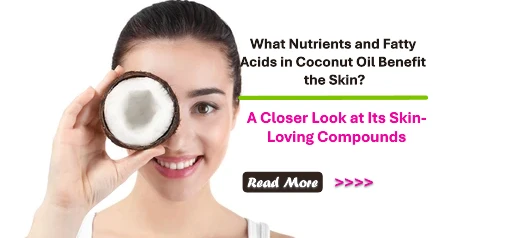What Nutrients and Fatty Acids in Coconut Oil Benefit the Skin? A Closer Look at Its Skin-Loving Compounds
What Nutrients and Fatty Acids in Coconut Oil Benefit the Skin? A Closer Look at Its Skin-Loving Compounds
Coconut oil is a natural skincare favorite, known for its soothing, hydrating, and antimicrobial properties. But what makes it so beneficial for the skin? The answer lies in its rich composition of nutrients and fatty acids that work together to nourish, protect, and improve the skin’s overall health. Understanding these compounds can help you decide how best to use coconut oil in your skincare routine.
Key Fatty Acids in Coconut Oil and Their Skin Benefits
Coconut oil is composed primarily of saturated fatty acids, which play crucial roles in moisturizing and strengthening the skin’s barrier. Some of the most important fatty acids in coconut oil include:
1. Lauric Acid (About 47–53%)
-
Primary Benefit: Antibacterial and antimicrobial
-
Why it helps: Lauric acid is the most abundant fatty acid in coconut oil and is known for its strong antimicrobial properties. It can help fight acne-causing bacteria (Cutibacterium acnes) and reduce the risk of skin infections. It also supports wound healing and may calm inflammation.
2. Caprylic Acid and Capric Acid
-
Primary Benefit: Antifungal and soothing
-
Why they help: These medium-chain fatty acids also exhibit antimicrobial and anti-inflammatory effects. They can help balance skin affected by fungal infections or irritation while adding moisture.
3. Myristic Acid
-
Primary Benefit: Cleansing and emollient
-
Why it helps: Myristic acid helps coconut oil penetrate the skin and acts as a mild cleansing agent, making it suitable for removing dirt and excess oil without over-drying.
4. Palmitic Acid
-
Primary Benefit: Skin barrier protection
-
Why it helps: This fatty acid aids in maintaining the integrity of the skin barrier, reducing moisture loss, and keeping skin soft and supple.
5. Oleic Acid (Monounsaturated Fat)
-
Primary Benefit: Softening and anti-inflammatory
-
Why it helps: Though present in lower amounts than in oils like olive oil, oleic acid contributes to skin softness and helps reduce inflammation in dry or sensitive skin types.
Nutrients and Antioxidants in Coconut Oil
Beyond fatty acids, coconut oil also contains essential nutrients and antioxidants that enhance its skin benefits:
1. Vitamin E
-
Benefit: Antioxidant protection
-
Why it helps: Vitamin E helps protect skin cells from oxidative stress caused by environmental damage (like UV rays and pollution), preventing premature aging and promoting healing.
2. Polyphenols
-
Benefit: Anti-inflammatory and antioxidant
-
Why they help: Polyphenols in coconut oil reduce inflammation and support overall skin health by neutralizing free radicals.
3. Phytosterols
-
Benefit: Barrier support and hydration
-
Why they help: These plant-based compounds help reinforce the skin barrier and lock in moisture.
Conclusion
Coconut oil is a powerhouse of skin-beneficial compounds, particularly due to its high content of medium-chain fatty acids like lauric, caprylic, and myristic acid. Combined with antioxidant-rich nutrients like vitamin E and polyphenols, coconut oil offers antimicrobial, moisturizing, and protective effects. While it may not be suitable for every skin type (especially acne-prone), its unique composition makes it an effective natural option for softening, soothing, and strengthening the skin.

Related Blog
What Causes Oily Skin and Can It Be Managed Naturally? Exploring Root Causes and Gentle Solutions
Aug 2, 2025 by Admin
General
What Are the Signs That You Have Sensitive Skin? Key Symptoms to Help You Identify This Delicate Skin Type
Aug 1, 2025 by Admin
General